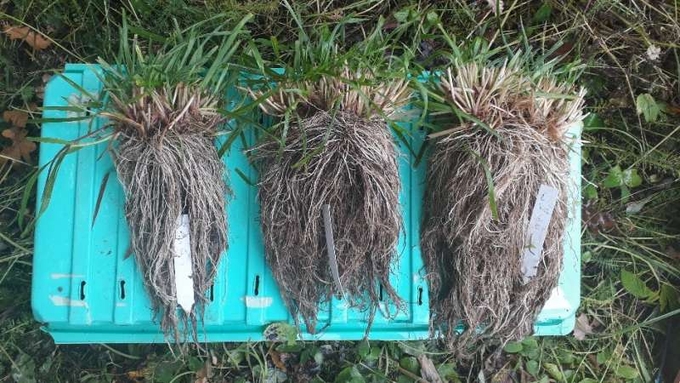November 25, 2025 | 20:38 GMT +7
November 25, 2025 | 20:38 GMT +7
Hotline: 0913.378.918
November 25, 2025 | 20:38 GMT +7
Hotline: 0913.378.918

Roots from study plants from herbicide-free soil representing intense mowing, with 5cm mowing height (left), less intense mowing with 15cm mowing height (middle) and no mowing (right). Roots are clearly smaller when the mowing intensity is higher. Photo: Kalle Rainio
The results provide a roadmap for reducing pesticide loads in soils and the first steps toward increasing climate change mitigation while improving crop yield in grasslands. The studies have been published in Scientific Reports and the Journal of Sustainable Agriculture and Environment.
Soil properties are an essential driver of plant quality, including resilience against climatic extremes and resistance against insect pests and pathogens.
The increasing food demand of the rising global population together with technological advancement and novel synthetic agrochemicals have resulted in agricultural intensification with the goal to maximize crop production.
"However, in recent decades, we have observed both a reduction in plant resilience and crop yields and the degradation of soil quality. This has resulted in an exponential need for chemical fertilizers and pesticides," says Docent Benjamin Fuchs from the Biodiversity Unit of the University of Turku, Finland.
"Only in recent years, we have started to realize that intensive agriculture and agrochemical pollution in fact contribute to a reversal of the intended purpose. Soils are polluted with pesticides and at the same time, extreme weather events erode soil nutrients," Dr. Fuchs continues.
Intensive harvesting and pesticide residues in soil limit root growth
One key challenge in the research was to find practical and sustainable ways to improve plant resilience and elevate crop yield while mitigating the carbon (CO2) emissions caused by human activity by enhancing carbon sequestration in the soil.
The researchers conducted two independent experiments at the University of Turku's research facilities at the Ruissalo Botanical Gardens in Turku, Finland. In the greenhouse and common garden studies, the research team showed that the intensity of mowing has a great impact on pastures. By reducing the intensity of the mowing and cutting the plant higher, the overall yield of the pasture increased and the plants developed bigger roots. This indicates a higher atmospheric carbon sequestration into belowground storage.
What was surprising, Fuchs emphasizes, is that the researchers found a detrimental effect of herbicide residues in soil on root growth regardless of the intensity of the yield harvest.
"This demonstrates a tremendous limitation to the potential carbon binding and storage belowground when soils are polluted by pesticide. Considering the vast amount of pesticides applied to agricultural fields yearly, we can conclude that the impact on soil quality is a major driver of limited root growth, carbon sequestration, and consequently plant resilience and productivity," Dr. Fuchs says.
The authors propose additional field studies to extrapolate their findings onto a field scale. Both studies conclude that climate change mitigation via optimizing carbon sequestration and storage in soil can be achieved by reducing pesticides, which will facilitate root growth and improve plant resilience.
All over the world, cultivated grasslands are used as grazing pasture as well as for growing fodder that is turned into hay and silage. They cover large parts of the world's agricultural land and have a tremendous potential for climate change mitigation through carbon storage. The plants use carbon dioxide as they grow, and some of this atmospheric carbon becomes bound in the soils.
"Consequently, understanding how pesticide pollution in soil and intensive management limit plant productivity is the key to optimizing intensive grassland-based agriculture in a sustainable and climate-friendly way," Fuchs concludes.
(Phys)

(VAN) Brazil's COP30 presidency pushed through a compromise climate deal on Saturday that would boost finance for poor nations coping with global warming but that omitted any mention of the fossil fuels driving it.

(VAN) Poultry farmers in the UK have been warned that they could face one of the worst winters yet for bird flu.

(VAN) Prices of main-crop paddy have risen sharply, with jasmine rice hitting 16,100 baht per tonne — the highest level in years.

(VAN) In Brazil, FAO unveiled a series of reports and initiatives showing how sustainable agrifood systems are a solution to the climate crisis.

(VAN) With names like neodymium and dysprosium, rare-earth elements sound exotic — and their perceived scarcity has only added to the mystique.

(VAN) In a new study published in Trends in Biotechnology, researchers used a gene-editing technology called CRISPR to increase a fungus's production efficiency and cut its production-related environmental impact by as much as 61%- all without adding any foreign DNA.

(VAN) A top official in Beijing’s Cop delegation says China is committed to clean energy – but US’s absence is a problem.